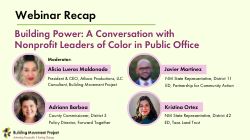May
19
2021
Quick Access: Recording, Transcript, BMP + New Mexico, On the Frontlines report, Race to Lead Revisited report, Race to Lead in New Mexico
Earlier this week, the Building Movement Project hosted a conversation with three nonprofit leaders of color who also hold elected office in New Mexico. We were joined by Adriann Barboa (County Commissioner of District 3 and Policy Director of Forward Together), Javier Martinez (NM State Representative of District 11 and Executive Director of Partnership for Community Action), and Kristina Ortez (NM State Representative of District 42 and Executive Director of Taos Land Trust), all of whom are long-time community organizers who, in addition to leading nonprofits, are leveraging their positions in public office to improve the lives of their constituents.
The discussion was moderated by BMP’s New Mexico-based consultant, Alicia Lueras Maldonado. Before diving into the conversation with the panelists, Alicia reviewed some of BMP’s recent reports and materials, namely Race to Lead Revisited: Obstacles and Opportunities in Addressing the Nonprofit Racial Leadership Gap, Race to Lead in New Mexico, On the Frontlines: Nonprofits Led by People of Color Confront COVID-19 and Structural Racism, and our related work in New Mexico. BMP has partnered with communities and nonprofits in New Mexico for many years, most notably through our Common Good Action Project. Through this and other efforts, we have witnessed the unique connections and relationships between organizers, nonprofit staff, community advocates, and individuals in public office that make working towards the common good and advancing social change possible in New Mexico.
To kick off the discussion, each of the panelists shared their journey into elected and nonprofit leadership, as well as the challenges of balancing these and any other roles that they play. While Kristina, Adriann, and Javier work on different issues, they all possess an organizing background as well as a deep understanding of and concern for the wellbeing of their community members. Kristina emphasized that many of the issues she faced and cared about – basic needs, healthcare, reproductive rights, environmental justice – were impacting the rest of her community as well. She added that the best advocates are those who are embedded in the community and who understand people’s needs. Adriann confirmed this point and emphasized the importance of “destroying the distance between decision-makers and the people they serve” as a pathway to building people power and creating lasting change.
Regarding the challenges of their dual leadership roles, Javier noted that balancing the demands of both roles is a delicate and difficult process, and that on top of being held accountable, one often has to accept the limitations of working within both sectors. Kristina shared that there often is not a healthy balance and that a key learning has been to accept that one person cannot do everything on their own. She suggested a three-step process that has proven helpful for her: 1) Prioritize; 2) Simplify; 3) Ask for help.
The next part of the panel discussion focused on the successes and challenges of the recent legislative session, as well as what’s ahead for each of the panelists. Javier highlighted the successful passing of the Permanent Fund for Early Childhood (HJR 1) as well as the New Mexico Civil Rights Act (HB 4), Kristina uplifted the Repeal Abortion Ban (HB 7), and Adriann mentioned the Healthcare Affordability Fund (HB 122). In thinking about what’s ahead, Javier noted that fundraising is a difficult and unpleasant reality in these processes, but that it is vital to passing legislation. Kristina added that the accomplishments of this past legislative session and the responsiveness to COVID-19 is encouraging, but that New Mexicans need and deserve far more support for the long term. Adriann closed out this section of the conversation by emphasizing the need to address root causes when crafting and pushing legislation designed to improve the lives of New Mexicans.
Towards the end of the discussion, the panelists shared their thoughts on the potential power of nonprofits to influence policy, on building power within their organization, and their bold solutions for the future. Adriann offered some reflection questions that can be useful for leaders within any sector: How can I be intentional about building relationships? How can I be in right relationship with my community? How can I leverage my power? Kristina provided a list of action items for philanthropy and the nonprofit sector, specifically around supporting nonprofit leaders of color, providing ample financial support, and being flexible with the needs of nonprofit staff. Javier reminded us of the power of working in collaboratives and coalitions, and how individuals and organizations are never truly in silos, but are part of a larger ecosystem dedicated to social change.

